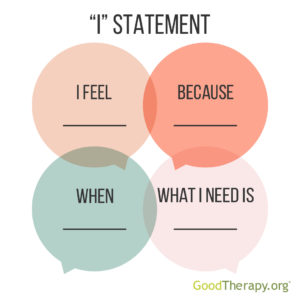#BlackMaleTherapist,#AfricanAmericantherapist, #Triple5LightTherapy, #ABLM, #BLM, #LatinX, #AsianX, #POC, #LGBTAffirmingTherapy,
An “I” message or “I” statement is a style of communication that focuses on the feelings or beliefs of the speaker rather than thoughts and characteristics that the speaker attributes to the listener. For example, a person might say to his or her partner, “I feel abandoned and worried when you consistently come home late without calling” instead of demanding, “Why are you never home on time?”
ROLE OF “I” STATEMENTS IN COMMUNICATION
Thomas Gordon developed the concept of an “I” statement in the 1960s and contrasted these statements to “you” statements, which shift blame and attributions to the listener. “I” statements enable speakers to be assertive without making accusations, which can often make listeners feel defensive. An “I” statement can help a person become aware of problematic behavior and generally forces the speaker to take responsibility for his or her own thoughts and feelings rather than attributing them—sometimes falsely or unfairly—to someone else.
When used correctly, “I” statements can help foster positive communication in relationships and may help them become stronger, as sharing feelings and thoughts in an honest and open manner can help partners grow closer on an emotional level.
“I” STATEMENTS IN THERAPY
Mental health professionals commonly encourage people in therapy to use “I” statements when communicating with others. This technique is particularly common in marital counseling, as couples often get trapped in a potentially vicious cycle of perpetual blame without ever addressing the underlying feelings or attachment issues that may be leading to conflict. “I” statements may allow couples to work through their disagreements in a way that allows them to express their opinions and feelings to each other without assigning blame and placing further strain on the relationship.Couples in the early stages of marital counseling may misuse “I” statements. For example, a man might say to his partner, “I hate it when you do not listen to me.” Although this statement does start with “I,” it might still be interpreted as accusatory and may not be the healthiest way to express feelings. A better “I” statement might be, “When you do not listen to what I am saying, I feel ignored and unloved.” Therapists often help those they are treating to practice appropriate “I” statements and explore ways to respond to the feelings that these statements communicate.
“I” statements are often also effective in family counseling because they focus on the effects of a child or parent’s actions rather than on the action itself. It may be easier for family members to communicate when an action is not singled out for blame, and young adults and adolescents, in particular, may be more receptive to hearing how their actions have affected others when the language used is not accusatory.
EXAMPLES OF “I” MESSAGES
Many people do not communicate naturally with “I” statements, and it often takes some practice before a person can use them effectively. That said, generally, everyone can learn to use “I” messages, including children.
Some examples of “I” statements:
- A father wants his young child to stop calling him rude names during playtime.
- Common response: “Hey! If you call me a rude name one more time, I’m going to send you straight to bed!”

- “I” statement response: “I feel very sad when I hear rude words because they hurt my feelings. I like playing with people who use nice words.”
- Common response: “Hey! If you call me a rude name one more time, I’m going to send you straight to bed!”
- A woman becomes angry when her sister borrows her favorite coat and returns it with stains and a tear.
- Common response: “You ruined my jacket! Are you ever going to grow up?!”
- “I” statement response: “I am upset that my coat was damaged because I can’t afford to replace it. I really appreciate it when the things I loan out are taken care of.”
- A teenage boy is annoyed with his parents, who ask him several times each night if he has completed his homework.
- Common response: “Lay off me!”
- “I” statement response: “I feel frustrated and annoyed when I am reminded over and over to do my homework. I am old enough now to complete my homework without reminders.”
References:
- American Psychological Association. (2009). APA concise dictionary of psychology. Washington, DC: American Psychological Association.
- I-Statements. (n.d.). Retrieved from http://www.austincc.edu/colangelo/1318/istatements.htm
- Winters, K. (2003). Family Therapy. In Treatment of adolescents with substance use disorders. Rockville, MD: Substance Abuse and Mental Health Services Administration.


Comments
Post a Comment